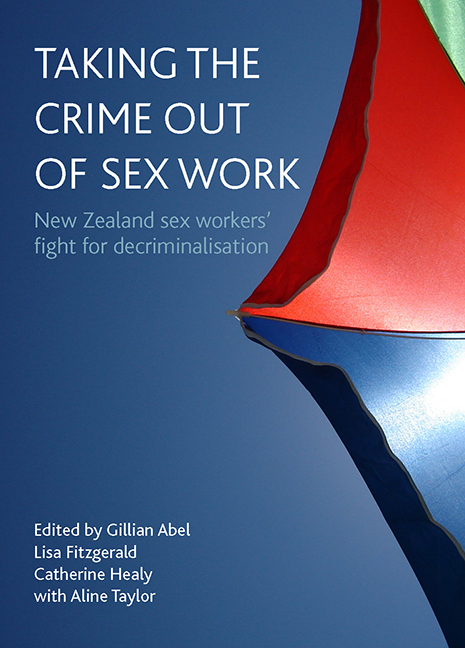Book contents
- Frontmatter
- Contents
- List of tables and figures
- Notes on contributors
- Acknowledgements
- one Introduction
- Part One Lead-up to the passing of the 2003 Prostitution Reform Act
- Part Two Implementation and impact of the 2003 Prostitution Reform Act: the first five years
- Index
- Also available from The Policy Press
eleven - Becoming inspectors of brothels: public health authorities’ experience of implementing the Prostitution Reform Act
Published online by Cambridge University Press: 01 September 2022
- Frontmatter
- Contents
- List of tables and figures
- Notes on contributors
- Acknowledgements
- one Introduction
- Part One Lead-up to the passing of the 2003 Prostitution Reform Act
- Part Two Implementation and impact of the 2003 Prostitution Reform Act: the first five years
- Index
- Also available from The Policy Press
Summary
‘I mean it was all very well for me to go into this place but how could I judge it if I’d never been into a parlour before…. So I realised there was just no way I could have any ability to use the legislation constructively (a) if I wasn't known and our role wasn't known and (b) if I had no idea of how the sex industry worked and of what, where it actually was and who was in it and what a brothel, actually what you would expect to find in a brothel. I nearly dissolved the first time I saw a client, but by the time I got to the last brothel, I was cheerily saying “good morning” to them.’ (Medical Officer of Health, Waikato)
Introduction
The passage of the 2003 Prostitution Reform Act (PRA) brought with it new and somewhat unexpected responsibilities for public health authorities, particularly Medical Officers of Health. The architects of the legislation clearly saw public health as an important consideration in regulatory reform of the sex industry (see Chapter Five) and indeed, Part 1, section 3 of the Act states that the purpose of the Act is to create a (legislative) framework that, among other things, ‘is conducive to public health’ (section 3(c)). The PRA makes Medical Officers of Health, who are designated officers under the 1956 Health Act, inspectors of brothels and gives them powers in relation to that function, including the appointment of other inspectors. Medical Officers of Health, and the public health services in which they work, have also made submissions to local authorities on proposed bylaws under the PRA, as they do on other bylaws and council plans relating to public health.
This chapter begins by outlining the statutory roles of Medical Officers of Health under the PRA and examines the early responses of public health authorities to implementing the legislation. The focus of the chapter is on the views of Medical Officers of Health and other public health and occupational health workers regarding their roles under the Act and their experience of its implementation. The various approaches taken by public health services to implementing the legislation are also discussed, including the approach to complaints and interactions with other agencies.
- Type
- Chapter
- Information
- Taking the Crime out of Sex WorkNew Zealand Sex Workers' Fight for Decriminalisation, pp. 173 - 196Publisher: Bristol University PressPrint publication year: 2010



